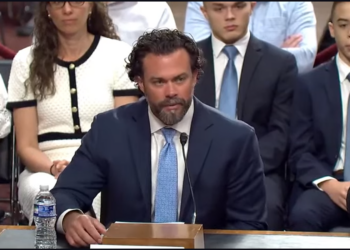The newly declassified annex to the Durham report purportedly shows that Hillary Clinton approved the Russia collusion hoax but then lied to the FBI about her knowledge of the plot.
Senate Judiciary Chairman Chuck Grassley released on Thursday the declassified appendix to Special Counsel John Durham’s 2023 report. The Durham report vindicated President Donald Trump and others who insisted the FBI acted improperly when it opened its investigation into the Trump campaign over allegations of collusion with Russia.
The declassified annex includes two Russian intelligence memoranda that purportedly contain information about Obama’s involvement in what is now known as the Russia collusion hoax, as well as private conversations between members of Clinton’s campaign.
In June 2016 the Democratic National Committee confirmed that its server had been hacked, allegedly by Russian military intelligence groups. Among the materials purportedly obtained by hackers were emails.
Leonard Benardo, of George Soros’ Open Society Foundations, purportedly said in one version of a July 25, 2016, email that the hacking story was important, and “politicization is on the table.” Benardo then went on to suggest that Julianne Smith, Clinton’s foreign policy adviser, was concocting a plan to “demonize Putin and Trump.”
“Now it is good for a post-convention bounce,” Benardo wrote, adding, “Later the FBI will put more oil into the fire.”
Two days later, Benardo purportedly said in a subsequent email that Clinton approved an “idea about Trump and Russian hackers hampering U.S. elections.”
“That should distract people from her own missing email, especially if the affair goes to the Olympic level,” the email read.
The declassified annex states that “Certain [redacted] analysts and officers … who were well-versed in the Sensitive Intelligence collection, stated that their best assessment was that the Benardo emails were likely authentic,” though others raised the possibility that the emails may have been “fabricated or altered.” Benardo himself told officials that, to the best of his recollection, he did not draft the emails. According to the annex, he did admit “that the last sentence in the email — noting that ‘things are ghastly for US-Russian relations’ — sounded like something he would have said.”
The declassified annex later states that the “best assessment” is that the purported Benardo emails “were ultimately a composite of several emails that were obtained through Russian intelligence hacking” of several U.S. think tanks.
Despite the documents purportedly showing that Clinton personally “approved” the launch of the Russia collusion hoax, Clinton and members of her campaign told the FBI they had no knowledge of such a plan to link Trump and Russia.
Clinton told officials that the July 2016 declassified Sensitive Intelligence Material “looked like Russian disinformation,” while Clinton Campaign Chair John Podesta said the information was both new to him and “ridiculous,” while also saying that the campaign had no involvement with the “plan.”
Senior Policy Advisor Jake Sullivan (who would later serve as President Joe Biden’s U.S. National Security Advisor) said he also had not seen the memorandum but thought it “ridiculous.” Sullivan did, however, admit that the campaign focused on Trump and Russia, but he purportedly “could not recall anyone articulating a strategy or ‘plan’ to distract negative attention away from Clinton by tying Trump to Russia,” according to the annex.
Despite insistence from Clinton and other members of her campaign, the declassified annex states that a review of communications involving Smith possibly lend credibility to the “notion that the Clinton campaign was engaged in an effort or plan in late July 2016 to encourage scrutiny of Trump’s purported ties to Russia, and that the campaign might have wanted or expected the FBI or other agencies to aid that effort (‘put more oil into the fire’) by commencing a formal investigation of the DNC Hack.”
The annex points to an email from Smith to “think tank colleagues” as providing “credence that such a plan existed,” and it cites additional communications via text between Smith and an unidentified Clinton adviser as potential evidence of the Clinton campaign’s desire to see the FBI become involved.
Furthermore, the CIA “sent the FBI an ‘investigative referral’ memorandum that referred to, among other information, the purported Clinton campaign plan,” the declassified annex states.
Brianna Lyman is an elections correspondent at The Federalist. Brianna graduated from Fordham University with a degree in International Political Economy. Her work has been featured on Newsmax, Fox News, Fox Business and RealClearPolitics. Follow Brianna on X: @briannalyman2
















